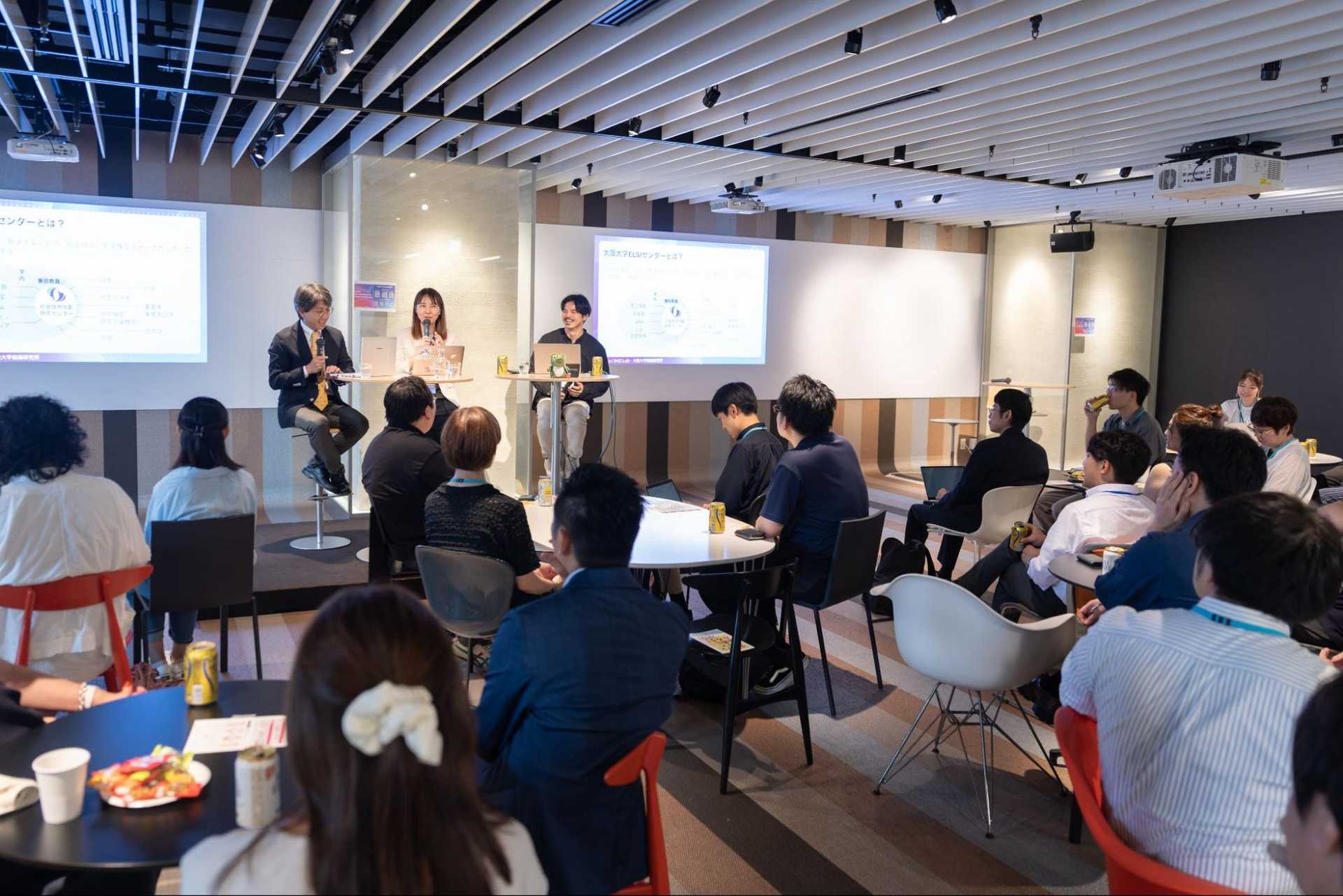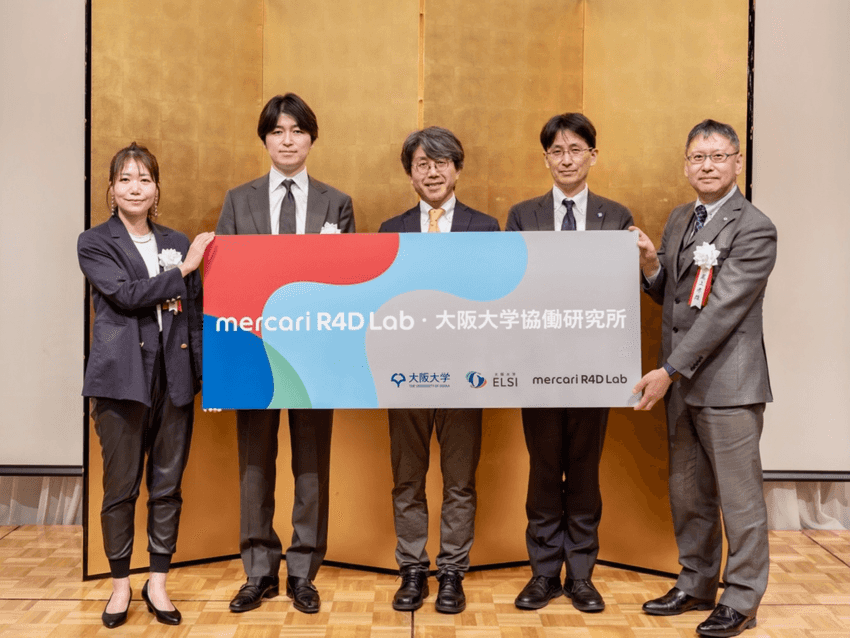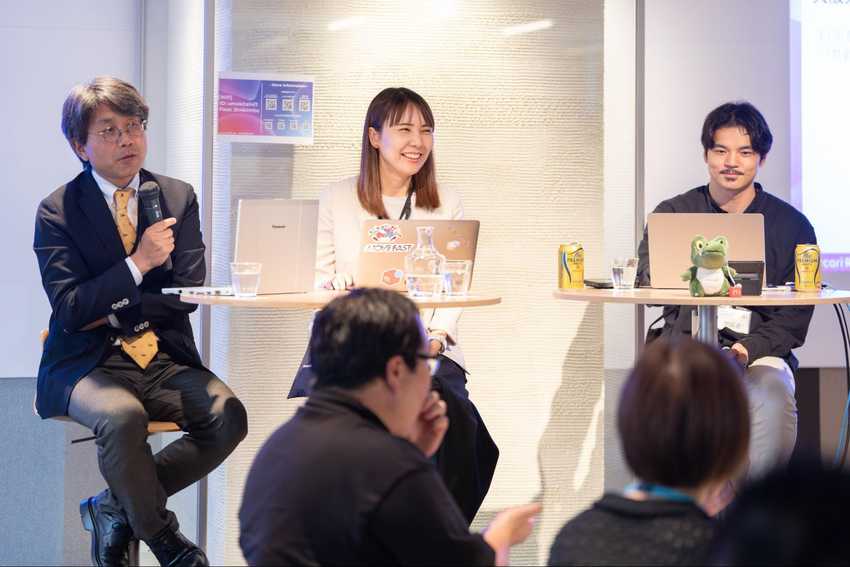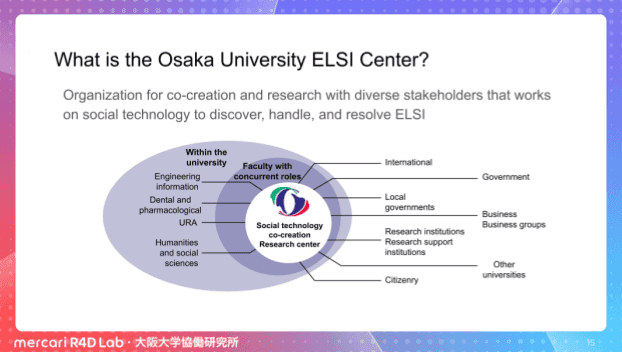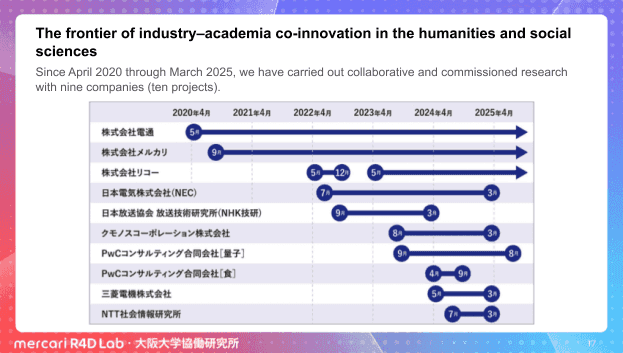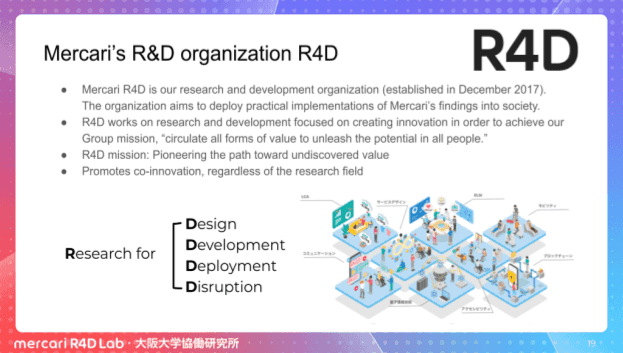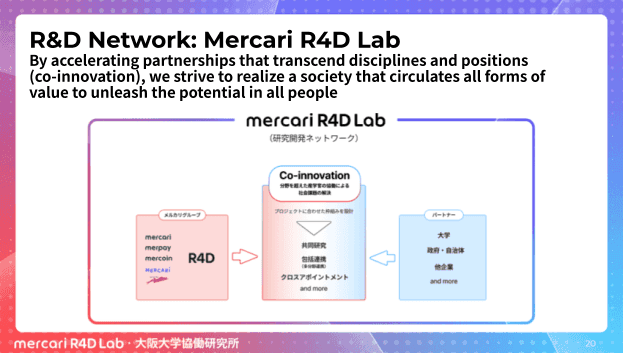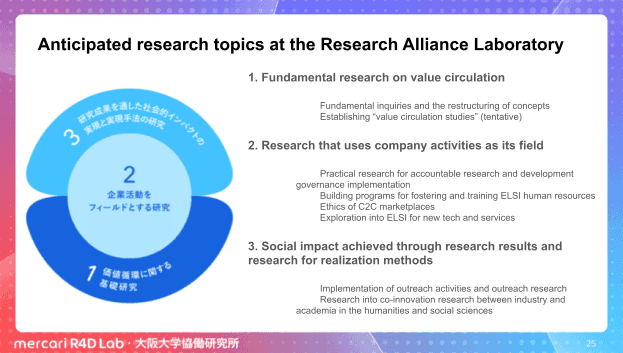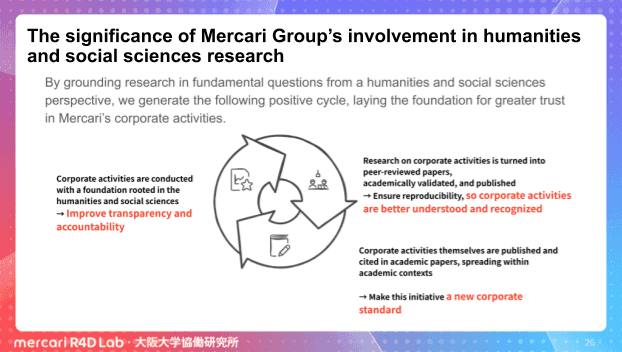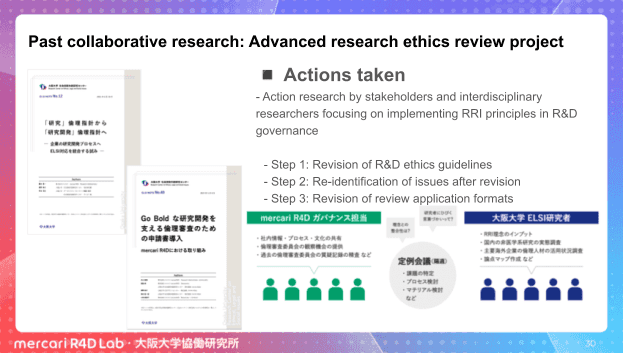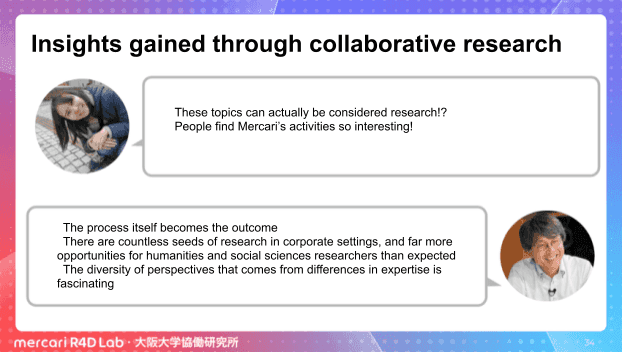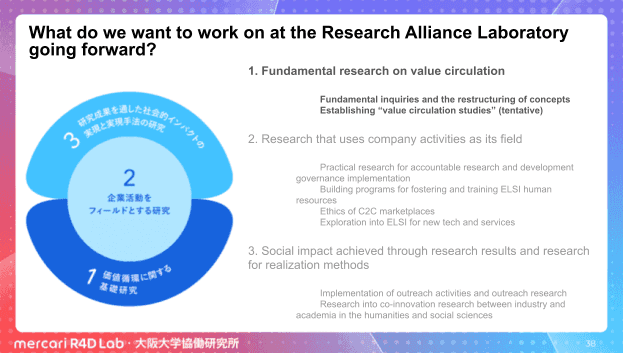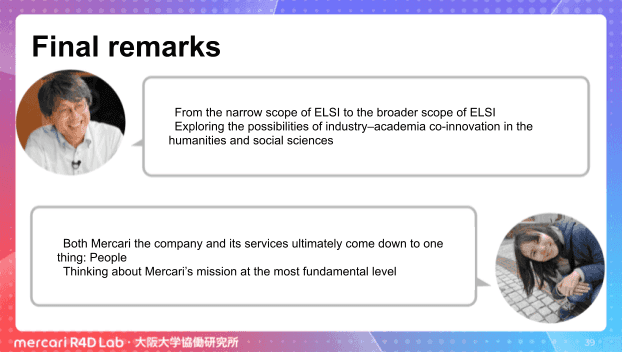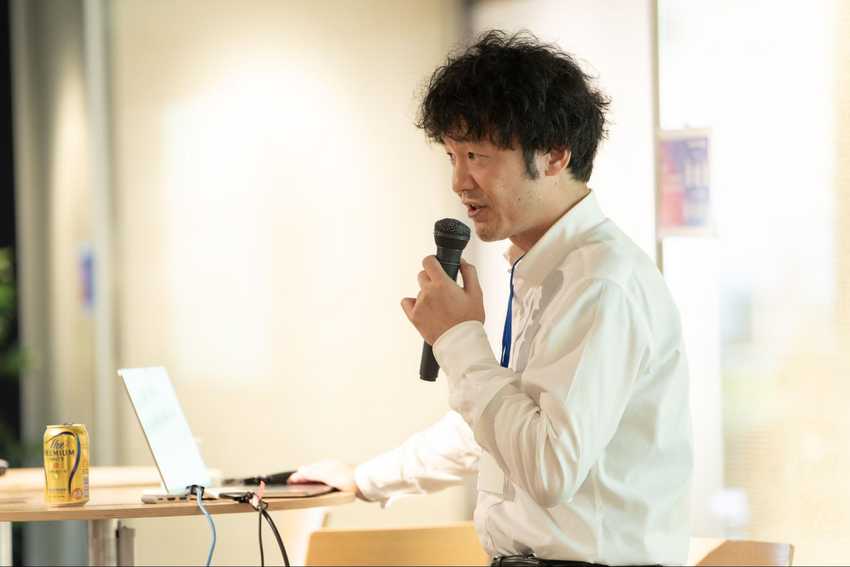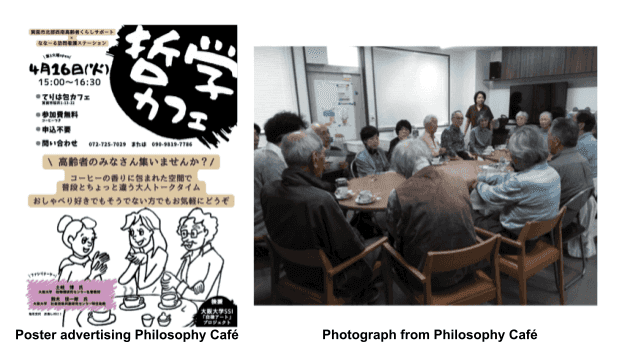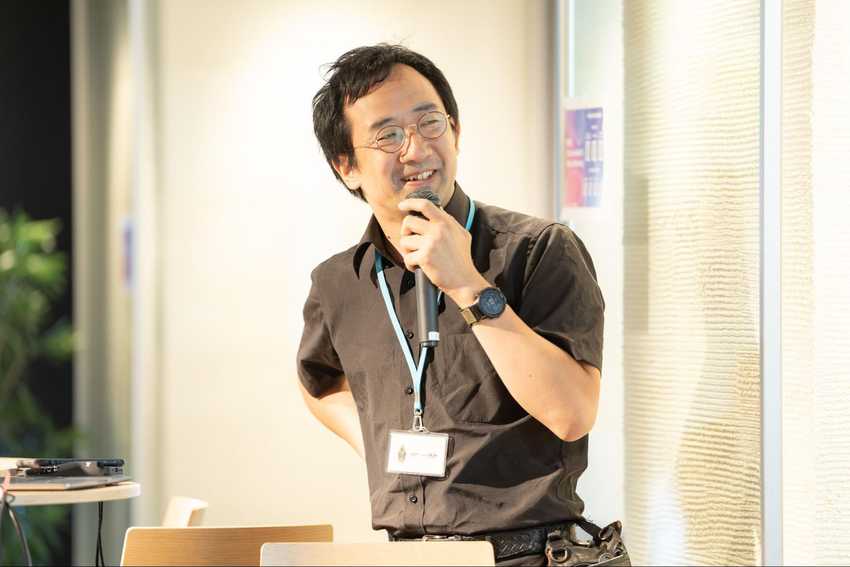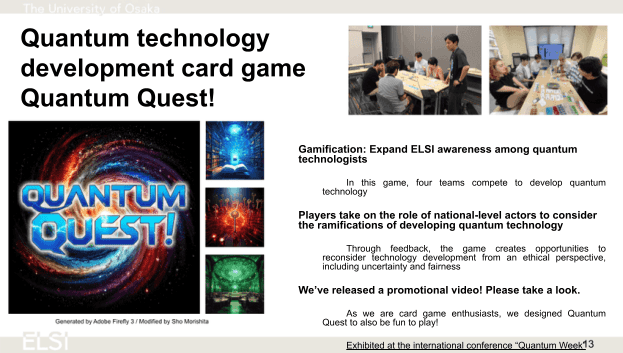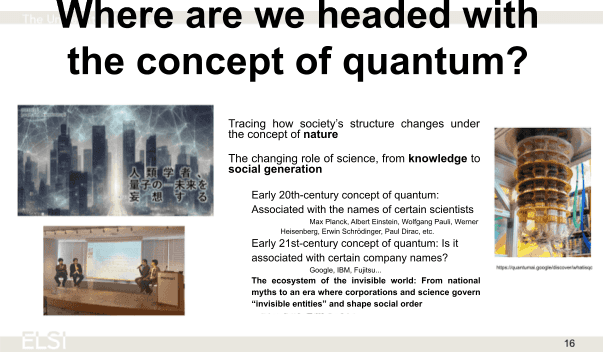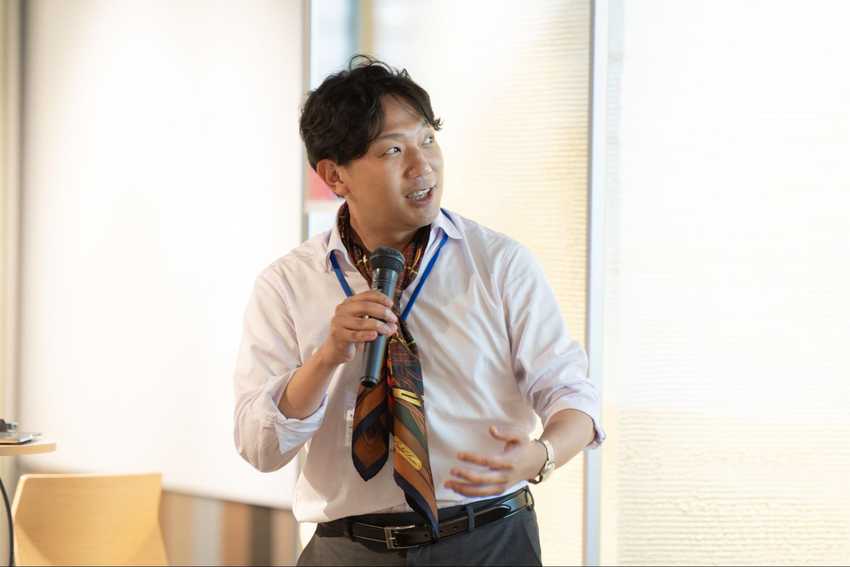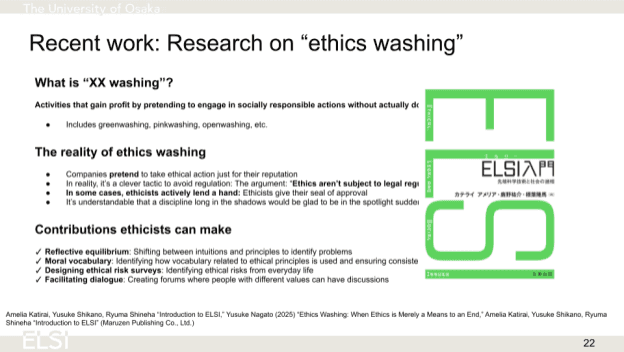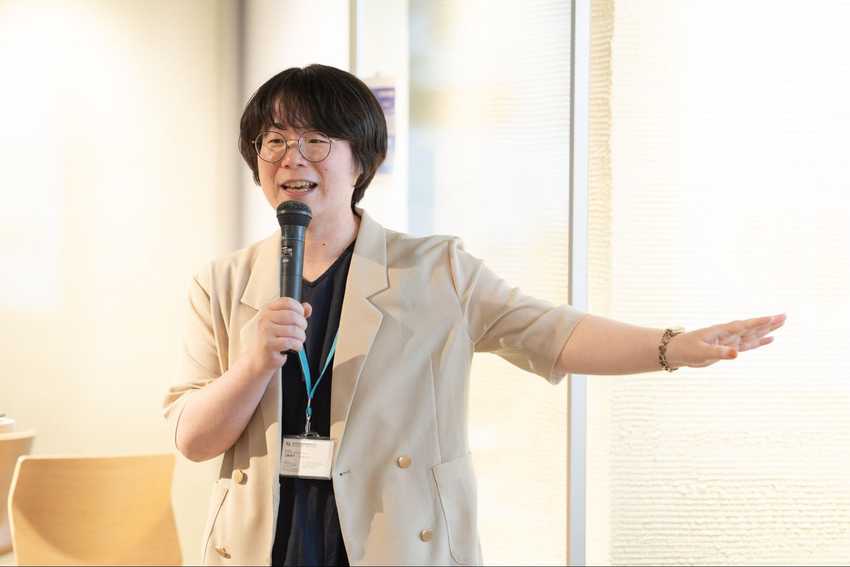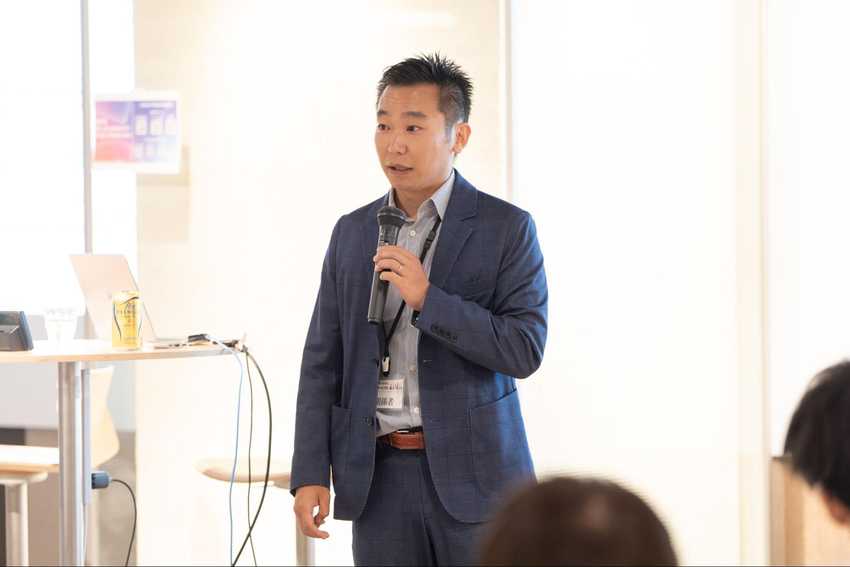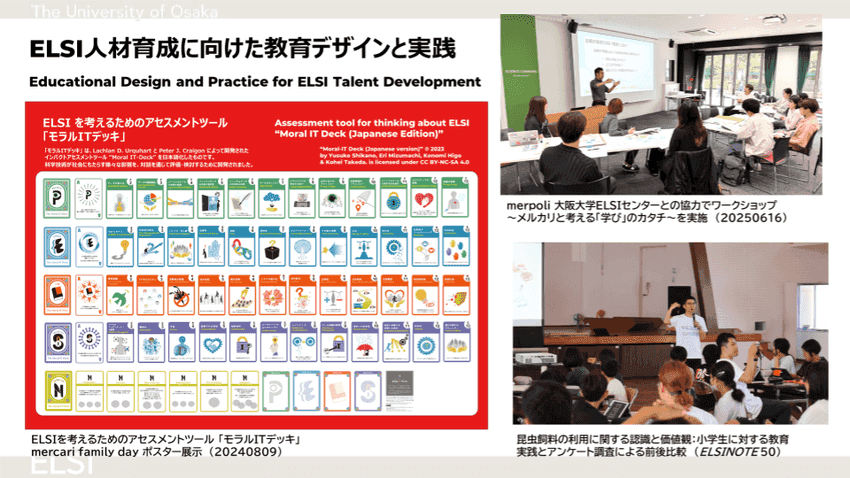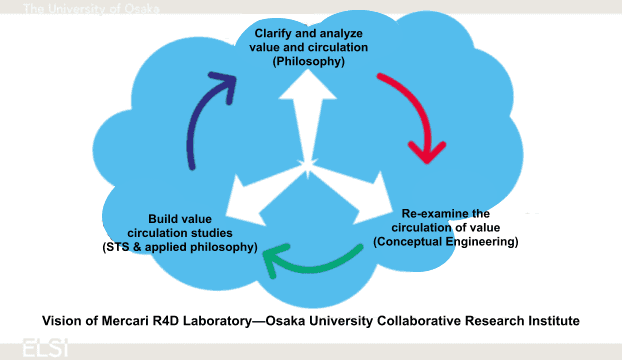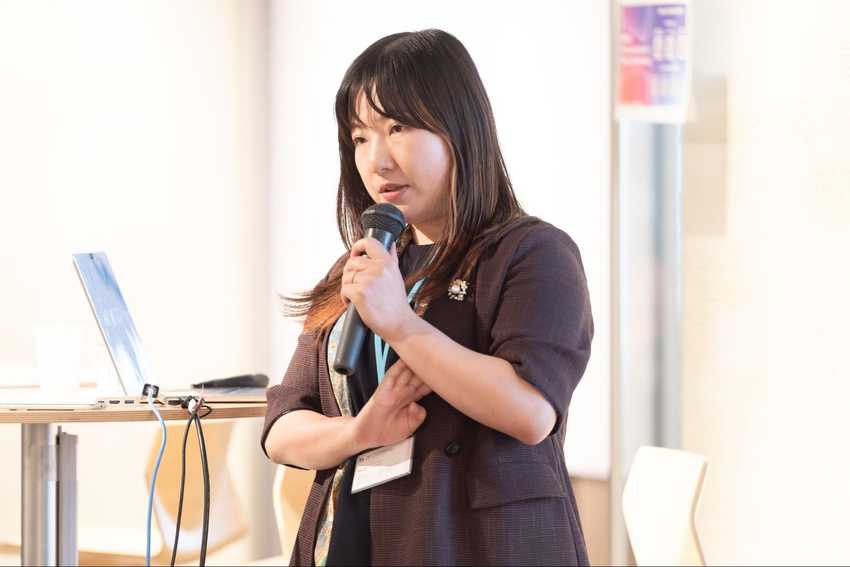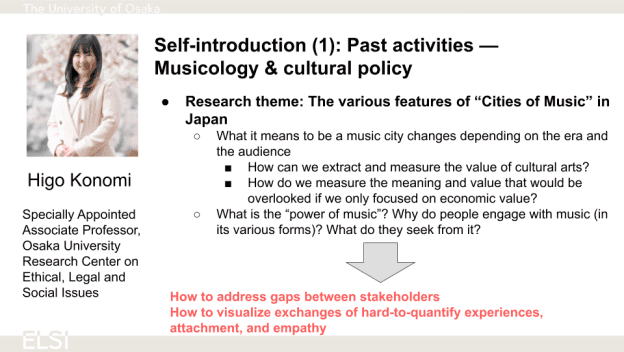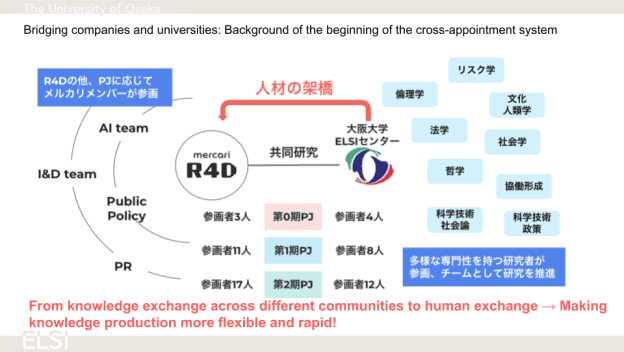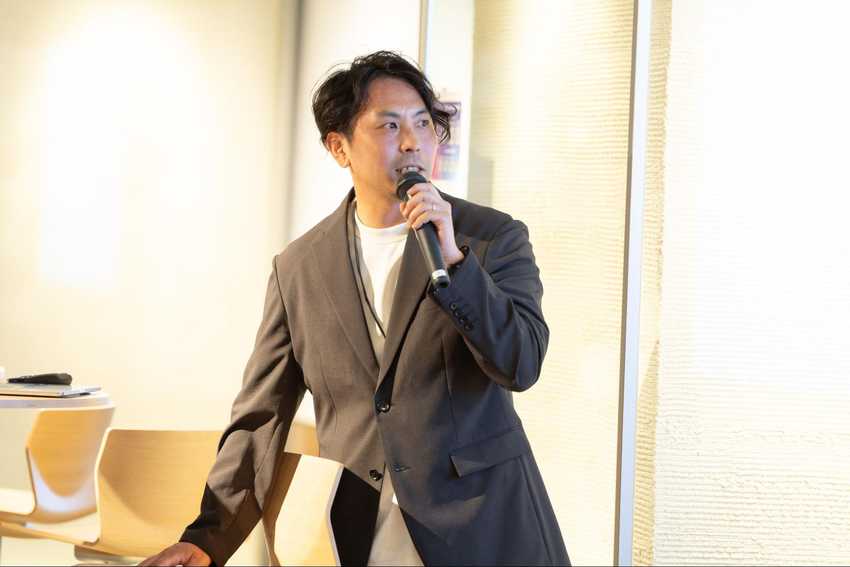Greetings!
This is @afroscript(Yusaku Kinoshita), and I’m in charge of outreach initiatives at Mercari R4D Lab.
On July 1, 2025, the Osaka University ELSI Center and Mercari launched the Mercari R4D Research Alliance Laboratory. Through knowledge of the humanities and social sciences, this laboratory aims to establish academic studies on value circulation to light the way to creating a world that circulates all forms of value.
As the first step in launching the Research Alliance Laboratory, we held an opening ceremony at the Senri Hankyu Hotel in Osaka on July 15, 2025. Later that evening, we also held a founding celebration event in the Knowledge Salon at Grand Front Osaka.
Click here for a report on the celebrations
The Mercari R4D Research Alliance Laboratory Founding Celebration Event, held in the evening, was composed of the following three parts.
- Part 1: Panel Discussion—The Road to the Beginnings of the Research Alliance Laboratory and Our Future Path
- Panelist: Atsuo Kishimoto (Center Chief, Research Center on Ethical, Legal and Social Issues, Osaka University)
- Panelist: Mari Inoue (Manager, Mercari, Inc. research and development organization R4D)
- Facilitator: Yusaku Kinoshita (Outreach for Mercari, Inc. research and development organization R4D)
- Part 2: Researchers Discussion (presenters are listed in Japanese alphabetical order)
- Ryota Akasaka (Associate Professor, Research Center on Ethical, Legal and Social Issues, Osaka University)
- Fumiko Kudo (Specially Appointed Associate Professor, Research Center on Ethical, Legal and Social Issues, Osaka University)
- Yusuke Shikano (Specially Appointed Professor, Center for the Study of Co* Design, Osaka University)
- Keiichiro Suzuki (Specially Appointed Professor, Research Center on Ethical, Legal and Social Issues, Osaka University)
- Yusuke Nagato (Instructor, Research Center on Ethical, Legal and Social Issues, Osaka University)
- Konomi Higo (Specially Appointed Professor, Research Center on Ethical, Legal and Social Issues, Osaka University)
- Sho Morishita (Visiting Academic Staff, Research Center on Ethical, Legal and Social Issues, Osaka University)
- Part 3: Mingling time
In this article, we’ll tell you all about our founding celebration event, how it unfolded, and what it was like to be there in person.
We invite anyone interested in our Research Alliance Laboratory or in this industry-academia alliance of the humanities and social sciences to read on.
Part 1: Panel Discussion—The Road to the Beginnings of the Research Alliance Laboratory and Our Future Path
What is the Osaka University ELSI Center?
Kinoshita: To get started, I’d like to ask our two panelists to tell us briefly about the organization they belong to.
Kishimoto: Well, Osaka University ELSI Center is short for the organization’s official name, the University of Osaka Research Center on Ethical, Legal and Social Issues. It incorporates the message that we don’t just engage in topics limited to science and technology, but rather believe that without research and development into the social sciences, you cannot divine innovation.
We established the Osaka University ELSI Center in April 2020, and celebrated its fifth year in 2025. During the past five years, we’ve seen ELSI centers start operations at various universities.
When we established it in April of 2020, we were thinking of it as mainly a place for academic partnerships. However, the center found itself unexpectedly entering into one partnership for collaborative research after another. Companies like Dentsu and Mercari, which have been vocal in promoting research partnerships between industry and academia in the humanities and social sciences from the inception of our collaborative research, have led to this next step in collaborative research. People have shown a lot more excitement than we thought they would, and we now feel that industry-academia partnerships in the humanities and social sciences are only just starting to gain momentum.
What is the Mercari R4D Laboratory?
Inoue: Mercari Group has developed a platform that circulates various forms of value under the mission “circulate all forms of value to unleash the potential in all people.” For example, the Mercari marketplace app that allows users to buy and sell items they no longer need from each other; Mercari Shops, which allows businesses to also create online shops; the Merpay mobile payment service, which allows users to make purchases using their Mercari sales balance; a service provided by Mercoin that allows users to trade bitcoin; Mercari NFT, which allows users to buy and sell NFTs; and Mercari Hallo, which allows users to circulate value by using their free time and personal skills.
R4D was established in December 2017 as a research and development organization within Mercari. An important point to note is that the name of the organization is not “R&D,” but rather “R4D;” there are four Ds (Design, Development, Deployment, and Disruption). Especially when it comes to Disruption, one trait of R4D is that it aims to create the future and implement innovations in the community while breaking away from existing mindsets. Since we engage in research in order to achieve Mercari’s mission rather than to simply develop services and products, we promote co-innovation where any research field is eligible.
Mercari Group cannot “create a world that circulates all forms of value” in isolation. For this reason, there is a need for partnerships with universities, national and local governments, and other companies. Through such initiatives as collaborative research, comprehensive partnerships between organizations, and cross appointments, we have put together a structure able to form partnerships that extend across research topics and positions. In July of 2025, we renamed our research and development network “Mercari R4D Lab” and strengthened its promotion of research.
What does the Mercari R4D Research Alliance Laboratory do exactly?
Kishimoto: At Osaka University, we have a system where companies can collaborate with us by establishing research bases within university departments to conduct collaborative research. We call these “Research Alliance Laboratories,” and as of July 2025, there are 25 of them. The Mercari R4D Research Alliance Laboratory is Osaka University’s first case in the humanities and social sciences field.
We explain the activities of the Mercari R4D Research Alliance Laboratory using what we call the “Dorayaki Model.” (Dorayaki is a traditional filled pastry popular in Japan.) Up until now, our focus has been on the “filling in the middle” (2. Research that uses company activities as its field). This includes collaborative research such as assessments of specific technologies like the quantum internet, which R4D is researching, and the creation of systems for research ethics reviews. Eventually, Mercari’s overall business activities themselves also became research subjects. We have also added two more layers to form a three-tiered structure. They entails fundamental research in the humanities and social sciences to support a “world that circulates all forms of value,” and meta-science, which objectively defines and verbalizes questions like “What does industry–academia collaboration in the humanities and social sciences mean?” and “How should it be carried out?”
Kinoshita: From Mercari’s perspective, we are very pleased that Osaka University is interested not only in the research Mercari is conducting but also in Mercari as a company itself. Conversely, you have to wonder: Why did Mercari decide to pursue research in the humanities and social sciences together with Osaka University?
Inoue: Over the past five years of collaborative research on ELSI, we’ve come to see a positive cycle emerge from academically studying actual corporate activities. First, by grounding Mercari’s corporate activities in the humanities and social sciences, we can increase transparency and accountability. In corporate activities, we are often required to make value judgments that are not clearly defined by laws or rules. By engaging in discussions from diverse perspectives through different areas of expertise, we feel that we can build consistent reasoning and approaches that are not just self-serving.
Furthermore, when these activities—including their processes—are academically substantiated in the form of papers, corporate activities can be better understood and recognized. We believe that once these works are referenced and cited, they can serve as models that other organizations can also refer to. What began as the efforts of a single company could grow into something that enables the entire community to approach the realization of a “world that circulates all forms of value.”
Collaborative research we’ve worked on to date
Kinoshita: I’d like to hear more about the specific kinds of research Osaka University and Mercari have worked on together so far. Today, we’d like to introduce three examples. First, could you tell us about the Advanced Research Ethics Review Project?
Kishimoto: It all began with a six-month feasibility study (a small-scale, short-term collaborative research project). What R4D was looking for was not an ethics review like those in the life sciences, but one tailored to the technology field; and not just for the research stage, but one that also considered impacts at the stage of social implementation. Then, during one of our online meetings, someone asked whether what we were doing was more of a research and development ethics review rather than just a research ethics review. That moved the project forward, and together we were able to create guidelines, checklists, and processes for ethics reviews. Interestingly enough, this led us to ask what was happening with ethics reviews at Osaka University. This then evolved into research to enhance ethics reviews beyond just medical fields at the university.
- References:
- Mercari R4D and Osaka University’s ELSI Center Release Application Form and Checklist for Research and Development Ethics Reviews
- Mercari Publishes Proprietary Ethical R&D Guidelines Based on Joint Research with Osaka University’s ELSI Center (available in Japanese only)
- ELSI NOTE No. 12—Updating ethical principles from “for research” to “for research and development”: A feasibility study for integrating ELSI conception into corporate research and development
- ELSI NOTE No.40—Introduction of Application Forms for Ethical Review to Support Go Bold: Research and Development Efforts to Enhance Research Ethics Review at Mercari R4D.
Kinoshita: Let’s move on to the Quantum x ELSI case study. What can you tell us about that?
Kishimoto: There were two reasons we decided to focus on quantum technologies. First, we reasoned that ELSI considerations should be addressed together with research and development from the very early stages. For example, developers have said that, much like what happened with generative AI, considering ELSI only after the technology has already been released into society is too late. We reasoned that quantum technology would be a suitable case for addressing ELSI early. Second, Osaka University has been actively researching quantum computers, and R4D has been studying quantum internet. As part of our collaborative research, we created things like ELSI NOTE, academic papers, and even a card game called Quantum Quest to visualize the relationship between quantum technology and society. We believe that this kind of know-how can also be applied to other emerging technologies, such as nuclear fusion.
- References:
- Osaka University ELSI Center and R4D’s Quantum Information Technology Team Use IEEE Quantum Week to Announce “Quantum Quest,” a Card Game for Contemplating the Future of Quantum Technology
- Created by Collaboration Between the Osaka University ELSI Center and R4D’s Quantum Information Technology Team, the 29th ELSI NOTE, Titled “23 Topics About The Future of Quantum” Has Been Published
- ELSI NOTE No.18—A Focus Group interview survey of university students about their impressions of quantum technology
- ELSI NOTE No.29—23 Topics on “The Quantum Future”: Intensive interview with Mercari R4D Quantum Information Technology Team, Mercari, Inc.
Kinoshita: Lastly, let’s look at the third case study: “Analyzing Mercari’s Initiatives on I&D.” What is there to know about this?
Inoue: Well, in 2023, Mercari worked on correcting its gender pay gap. To put it specifically, we revealed publicly that there was a 7% gender pay gap among our employees that couldn’t be explained by their role or grade, and then shrank it down to 2.5%. This initiative drew attention as being “a pioneering move in Japan,” but at the same time, people asked questions about the methodology we used to calculate the data and whether our initiative was something only Mercari could accomplish.
To address these questions, we held a workshop with Mercari members, Professor Fumiko Kudo from Osaka University, and experts in economics and data science. Together, we discussed foundational knowledge and data analysis models for examining the gender pay gap. We feel that by publishing these outcomes in an ELSI NOTE, we have been able to make this knowledge accessible as a resource that other organizations can also refer to.
- Reference
- Now on YouTube: Understanding Mercari’s Initiatives to Address the Gender Pay Gap With a Researcher
- Summary of New ELSI NOTE “Illuminating Gender Disparities through HR Data: An Initiative towards Equalizing the Gender Pay Gap at Mercari, Inc.
- ELSI NOTE No. 36 Summary of New ELSI NOTE “Illuminating Gender Disparities through HR Data: An Initiative towards Equalizing the Gender Pay Gap at Mercari, Inc.
Insights gained through collaborative research
Kinoshita: After conducting several collaborative research projects, what kinds of insights have you gained?
Inoue: I originally thought that creating guidelines and application forms for research ethics reviews was just a natural part of corporate activities, so I was surprised to see these actually become research topics. It also struck us that members of the ELSI Center found Mercari’s activities genuinely interesting. When we said, “We’re kind of struggling with this issue,” they replied, “We were curious about the same thing and have been looking up papers,” which was a pleasant surprise.
Kishimoto: Even within the university, creating research ethics review processes would normally be treated as administrative work. However, through our collaborative research, we realized it could also lead to comparative research on existing ethics review processes. In humanities and social sciences research, output isn’t the only measure of success. Rather, the process justifies the output—or more strongly, only the process can truly justify the output. That’s why carefully documenting the process itself constitutes research, and it means there is an endless supply of research material.
To put it bluntly, I think many researchers in the humanities went to graduate school because they didn’t feel suited to working in companies, or because they were eccentrics who couldn’t see themselves in the working world, so most never expected to get jobs at private companies. That’s why even getting a glimpse of corporate activities through collaborative research can be a fascinating experience. They also find it rewarding to discover that there are spaces within companies where their expertise can be applied.
A member of the ELSI Center once told me that they thought “philosophers only studied texts,” adding that they discovered there are actually a lot of research subjects in the real world too. I think it’s amazing that knowledge from the humanities and social sciences can be applied in collaborative research with companies.
What made you decide to establish the Research Alliance Laboratory?
Kinoshita: So, you’ve already worked on several collaborative research projects together, but what was the reasoning or intention behind taking it one step further and establishing the larger framework of the Research Alliance Laboratory?
Inoue: Our collaborative research originally started from a desire to study the ELSI aspects of R4D’s research projects. However, when the research focus expanded beyond just R4D as one division, and included cases like Mercari’s company-wide gender pay gap initiative, we realized that Mercari’s overall activities themselves could become a subject of research.
That’s why we wanted to go beyond project-specific collaborative research and develop organizational-level collaboration.
Kinoshita: It was actually Mercari that suggested organizational-level collaboration. How did Osaka University respond to that suggestion?
Kishimoto: When Mercari proposed organizational collaboration, those of us at Osaka University didn’t even know about the Research Alliance Laboratory system. So we first had to learn from colleagues about how to expand from collaborative research into this kind of industry-academia partnership.
As collaborative research proposals began coming not only from R4D but also from Mercari as a whole, we soon realized that the C2C marketplace itself could be a research subject. We saw Mercari’s proposal as a real opportunity. Also on Mercari’s part, since they were interested in collaborating not only with the ELSI Center but also with other departments such as economics and law, the Research Alliance Laboratory—designed to integrate collaboration across multiple departments—was a perfect fit.
What kinds of things would you like to pursue at the Research Alliance Laboratory going forward?
Kinoshita: You also see this in the Dorayaki Model, but why is that Mercari is engaging in fundamental research on value circulation?
Inoue: I used to feel that if someone had asked me what a world that circulates all forms of value looks like, I wouldn’t have been able to give them a clear answer. If the answer to that question remains vague, it also makes it hard for R4D to decide what exactly we should research. That’s why I felt it was necessary to dig deeper into questions about the nature of value and circulation, and ask whether negative consequences could arise from a world that circulates all forms of value.
Kinoshita: Indeed, even within Mercari, when we revisit the phrase “a world that circulates all forms of value,” I sometimes notice that people interpret it in many different ways.
Kishimoto: Just like in our work on the ELSI of educational data utilization (EdTech), when AI enters education, we inevitably arrive at fundamental questions about such things as what the role of a teacher is and what the essence of a school is. Many companies declare mission statements or purposes, but people are likely going to ask increasingly what they mean in concrete terms. As a pioneering case study, this collaboration between industry and academia in the humanities and social sciences through the Research Alliance Laboratory will help bring more clarity on Mercari’s mission. Academia’s role is to question things at the most fundamental level.
Kinoshita: From our experience working with researchers so far, I find it incredibly valuable that they ask questions starting from the most basic starting point. It forces us to pause and reflect. As a company, we often need to prioritize speed, which means we sometimes move forward without fully solidifying the basic foundation of why we are taking a certain action. If left unchecked, in the medium-to-long term, we might find ourselves asking, “Wait, why are we doing this again?”—and the very basis of our work could collapse. For Mercari, I think this Research Alliance Laboratory can serve as a place to pause, ask the fundamental questions, and firmly solidify our basic starting point.
Kishimoto: As academics, our ultimate goal is to systematize this into something like a book or a 15-lecture university course, and establish “value circulation studies” as a discipline. For the time being, we’re calling this field “value circulation studies,” but it’s a provisional name that might change, and we’d like to approach it with a degree of freedom.
Inoue: I personally want to study value circulation studies, and I’m sure Mercari employees would want to as well. My hope is that if value circulation studies can be offered at universities, it will nurture more people who share the same aspirations.
Kinoshita: It would be exciting if future students majoring in value circulation studies went on to join Mercari or the Research Alliance Laboratory.
Kishimoto: Value circulation studies will provide a foundation for Mercari’s daily decision-making and help guide decisions about the markets we will explore in the future. Some may say we’re just doing this for Mercari, but we want to show that the Research Alliance Laboratory will also benefit society as a whole. There may even be cases where we decide that something we’re working on turns out to be too Mercari-centric, and we choose not to pursue it as collaborative research. We also want to pair our work with meta-research into what the ideal form of industry–academia collaboration in the humanities and social sciences should look like.
Final remarks
Kishimoto: I want to expand our research beyond the ELSI framework and grow it into broader collaboration between industry and academia in the humanities and social sciences. There are very few similar cases so far, but I believe more will emerge going forward. I even want to incorporate our stumbling blocks as research topics and continue to expand collaboration between industry and academia in the humanities and social sciences.
Inoue: If we consider the diverse values of the people who use Mercari’s services, there are countless possible humanities and social sciences research topics for the Research Alliance Laboratory to address. We want to continue giving back to society at large through the knowledge we gain from our research. And as we revisit Mercari’s mission at its most fundamental level, we want to further probe what Mercari can and should do.
Part 2: Researchers’ Discussion
Next, in Researchers’ Discussion, some of the researchers participating in the Research Alliance Laboratory candidly discussed their past work, areas of expertise, and what they hope to pursue within the lab.
Keiichiro Suzuki (Specially Appointed Professor, Research Center on Ethical, Legal and Social Issues, Osaka University)
My background is in clinical philosophy. For the past decade I have been deeply engaged in philosophical dialogues, and I also serve as vice-representative of Café Philo, which was launched by the clinical philosophy lab I used to work with.
Philosophical dialogue doesn’t involve researchers debating philosophy with each other—it instead entails engaging in philosophical discussions with regular members of society outside the walls of the university. When experts have a discussion, the focus is on what is said. But when engaging in philosophy with the public, the focus shifts to who is doing the talking. I find that very interesting. For example, when we held a dialogue with elderly participants about their final resting place, some said, they don’t want to die in a hospital, or burden their family. But one participant, over 90 years old, said, “I don’t really care about my final resting place. When I was digging trenches in Manchuria as the Soviet army advanced, I thought, ‘I guess this will be my final resting place.’ Ever since then, I haven’t cared where I end up.”
In our collaborative research with Mercari, I participated in the Advanced Research Ethics Review Project. We also hosted the Mercari Philosophy Café, where we held a philosophical dialogue on the topic of reselling, and organized a workshop called “How to Realize Crazy Ideas.” ELSI is often seen as a brake that gets applied to new technologies, but looking at things from the opposite angle, I believe that if we try to proactively ask what would happen if a certain crazy idea could actually be realized, we would be able to unlock new technologies. I’ve been discussing this perspective with researchers and engineers.
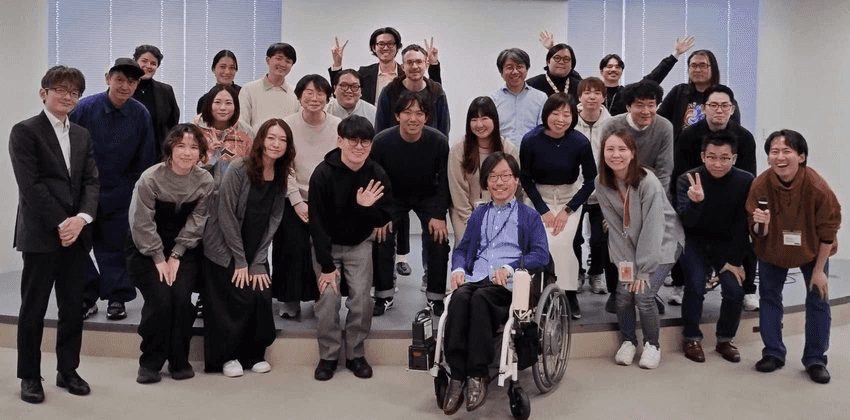 At the internal ELSI training session, “How to Realize Crazy Ideas”
At the internal ELSI training session, “How to Realize Crazy Ideas”
At the Research Alliance Laboratory, I hope to run projects that visualize the presence of people who want to engage in philosophical dialogue about questions hidden in society—not just at Mercari—and spark a movement for non-specialists to enjoy philosophy.
Sho Morishita (Visiting Academic Staff, Research Center on Ethical, Legal and Social Issues, Osaka University)
My specialties are cultural anthropology and philosophy of science, and at the Research Alliance Laboratory I’m working on a project called Responsible Quantum Technology Governance. In my first quantum-related project, I applied the anthropologist’s persona of going into the field and listening, interviewing R4D’s quantum information researchers for nearly ten hours and compiling the results into a 150-page report titled “23 Topics on “The Quantum Future”: Intensive interview with Mercari R4D Quantum Information Technology Team, Mercari, Inc.” Even several years after its publication, I still believe it’s an engaging read.
I also helped create the card game Quantum Quest about quantum technology development, which we presented at the Quantum Week international conference. Recently, we also released a one-minute introductory short video on Quantum Quest.
Since anthropologists also value maintaining their presence in the field over the long term, I plan to conduct four years of fieldwork at an actual quantum research facility. I am also writing papers that examine the meaning of quantum technology in modern society, drawing from geophysics and the history of science and technology. From the perspective of human history, I discuss how science is shifting from generating just knowledge to also shaping society itself.
Yusuke Nagato (Instructor, Research Center on Ethical, Legal and Social Issues, Osaka University)
As an ethicist, I handle the “E” in ELSI, but my first mission is to clear up common misconceptions about ethicists. Ethicists aren’t authorities on knowing what’s right and wrong. Rather, we are people who recognize the pitfalls that debates about right and wrong tend to fall into. We’re not necessarily experts on fundamental questions, but rather people who are especially concerned with those very questions. Our role is to clarify ethical concepts, such as justice and discrimination, and to contribute to putting ethical concepts into practice. I want people to understand the truth about ethicists.
Recently I’ve been emphasizing not only speculative research but also practical application. However, in collaborative research with companies, I don’t believe ethicists are there to just rubber-stamp corporate activities. When ethicists and companies work together, there’s a risk of slipping into “ethics washing”—dismissing concerns by saying that something isn’t a legal problem, but rather a matter of ethics, and ethically there’s no problem. To avoid contributing to that way of thinking, I wrote “An Introduction to ELSI.” At the Research Alliance Laboratory, I want to explore the ethics of C2C marketplaces.
Fumiko Kudo (Specially Appointed Associate Professor, Research Center on Ethical, Legal and Social Issues, Osaka University)
My specialty is law, and much of my work involves AI and data. But in my collaborative research with Mercari, I intentionally try to take on projects that don’t involve AI. For example, I worked with external experts to conduct third-party verification of Mercari’s efforts to correct its gender pay gap; our work was based on HR data. Analyzing HR data wasn’t part of my expertise, but I thought it looked interesting, and so I decided to take on the challenge. To bring in external perspectives, I reached out to Professor Kitagawa and Professor Hayashi, who had mentioned Mercari’s initiative on X (formerly Twitter), as well as Professor Makino, whose book “Gender Disparities” I had long admired. Normally, I wouldn’t build a team this way, but since it worked well for this collaborative research, I’d like to try more systematic and scalable approaches at the Research Alliance Laboratory.
More recently, as a field study using Mercari, I researched “Mercari Education.” In addition to interviewing Mercari employees, I also interviewed external experts and compiled the findings into a written case study. In another study, I used abduction (hypothetical reasoning) to examine why pre-orders for the popular game console “Nintendo Switch 2” were run as a lottery in Japan but on a first-come, first-served basis in the United States. The results are posted on YouTube and the ELSI NOTE webpage.
Yusuke Shikano (Specially Appointed Professor, Center for the Study of Co* Design, Osaka University)
My specialty is philosophy, and at R4D I mainly work in the field of conceptual engineering. Leveraging my expertise as a philosopher in handling concepts, I work to organize and clarify concepts in communication contexts. For example, as part of training future ELSI professionals, at the ELSI Center we conducted workshops with Mercari using the Japanese translation of the Moral IT Deck. In June 2025, we held a workshop on the Osaka University campus examining the public value of Mercari’s educational activities.
Since my specialty is analytic philosophy, at the Research Alliance Laboratory I also participate in projects that pause to examine questions about what value and circulation are and whether value is something that can circulate in the first place. Looking back on my work through the lens of value circulation, I can say that I’m clarifying and analyzing the meanings of value and circulation through philosophy, re-examining value circulation in real-world contexts through conceptual engineering, and working toward building value circulation studies as a field.
Konomi Higo (Specially Appointed Professor, Research Center on Ethical, Legal and Social Issues, Osaka University)
My research background is in musicology and cultural policy, and I have studied the “Cities of Music” initiative. When evaluating the value and outcomes of initiatives like Cities of Music and other cultural promotion, people tend to focus on easily quantifiable economic indicators, such as attendance numbers and economic impact. But I’m more interested in how we can measure and explain intangible effects, like the value of social interactions fostered by such initiatives.
At the Research Alliance Laboratory, I want to apply this experience to explore how we can bridge gaps between stakeholders and make visible exchanges of hard-to-quantify experiences and emotions, such as attachment and empathy.
I’ve also worked as a facilitator between different fields, engaging in outreach activities at the university. As Osaka University and Mercari’s collaborative research expanded and more people became involved, I predicted that not just knowledge exchange but also human exchange would accelerate innovation. So I spent two years at Mercari R4D under a cross-appointment system. During those two years, the ELSI Center and Mercari became increasingly close, and the number of participants and the number of research topics have continued to grow. Going forward, I want to continue hosting events like this one to further develop networks where people from diverse backgrounds can come together and promote vibrant research activity.
Ryota Akasaka (Associate Professor, Research Center on Ethical, Legal and Social Issues, Osaka University)
My background is in law, specializing in robotics law and information law. From my student days through to my previous job, I’ve always studied law in close proximity to people engaged in technology development. For example, I’ve worked on creating “Guidelines for Introducing Workstyles Using Avatar Robots,” which present interpretations of labor law with case examples, as well as guidelines for incorporating privacy considerations into academic research.
I have several topics I’d like to work on at the Research Alliance Laboratory. For example, I want to examine how intellectual property rights would apply if transactions in C2C marketplaces expanded to cover skills, experiences, or even sensations; how regulations on the sale of organs and blood are treated under comparative law; and how rights such as resale royalties in NFTs or the right to repair would be handled under Japanese law as part of value circulation.
